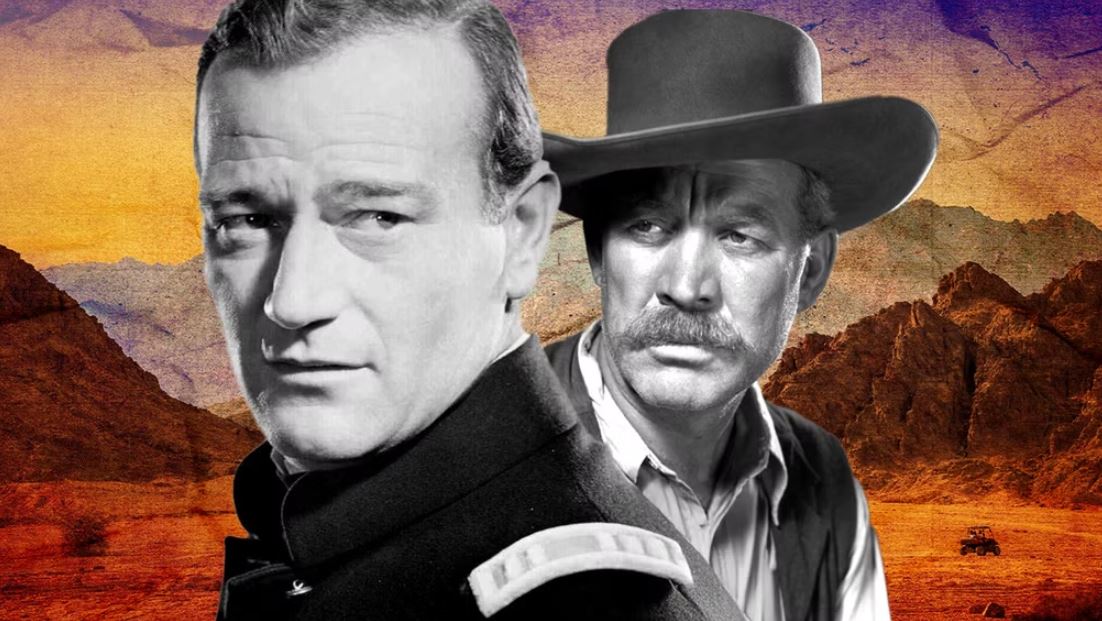The partnership between John Wayne and Ward Bond was more than just a professional collaboration, it was a friendship. Appearing in a whopping 23 movies together throughout their careers, with many under the direction of John Ford, Wayne’s image as an icon of American heroism in the Old West and the battlefield was supported by the steady hand of Bond, a prolific character actor who you could always count on to play a sheriff, sergeant, or neighborly folk in a local town.
Both being signature faces of the Western genre and Ford’s stock company of recurring actors, the Wayne-Bond duo simultaneously propped up Western myths and deconstructed the legends that the nation was founded upon. Fort Apache, one of the finest collaborations between Wayne, Bond, and Ford, is a riveting Western and war drama about America’s inescapable thirst for warfare and the loss of nobility in Western expansion.
John Wayne and Ward Bond Defined the West Across Their 23 Movies Together

The two actors go back so far that Ward Bond first knew the Duke by his birth name: Marion Robert Morrison. Before becoming a dynamic on-screen pair, John Wayne and Bond were teammates on the University of Southern California’s football squad. Once John Ford cast them in minor roles in his 1929 football drama Salute, they were indoctrinated into the prestigious John Ford stock company. In the following decades, Ford and Wayne would become synonymous with the archetypal director-actor pairing, but Bond was often there right beside them, starring in The Long Voyage Home, They Were Expendable, The Quiet Man, and The Searchers. Bond, the lead of the long-running Western series Wagon Train until his death in 1960, brought a sense of verisimilitude to Ford’s films, and his tough but wistful on-screen presence complemented the director’s tone.
Fort Apache, released in 1948 and starring Ford’s two signature screen avatars, John Wayne and Henry Fonda, kicked off the director’s cavalry trilogy, completed by She Wore a Yellow Ribbon and Rio Grande. These films combine Ford’s love for Westerns and war pictures, using the terrain of the Old West to ruminate on how America expanded during the 19th century. Fort Apache, set during the Civil War, follows Lt. Colonel Owen Thursday (Fonda) and Captain Kirby York (Wayne). York is a respected and honorable captain, while Thursday is an impulsive, power-hungry commander looking to seize control of the Fort Apache post and shows no decency toward the local Native American tribe. The film, also starring Shirley Temple as Thursday’s daughter, Philadelphia, features another stellar turn by Ward Bond, who plays Sergeant Major Michael O’Rourke, whose son strikes a romance with Philadelphia.
‘Fort Apache’ Humanized Native Americans and Grappled With American Warfare

John Ford has so many canonical classics that helped define our interpretation of American history that it’s easy to overlook the brilliance of a film like Fort Apache. A handsomely crafted Western with awe-inspiring vistas (with all the horizons placed at the top or bottom of the frame), the film is renowned for its groundbreaking, sympathetic treatment of Native Americans. Ford highlights the torturous history of bloodshed against Native Americans without patronizing their existence. The opposing dispositions of Thursday and York prove to be futile, as either way, the American military complex is destined to eliminate the sovereignty of the Native people. Before deconstructing the classical Western in The Man Who Shot Liberty Valance, Ford reflected on the mythmaking of the armed forces, as the film ends with a sobering coda that depicts its deeply complex and morally inscrutable characters as outright heroes worthy of jingoistic glorification.
John Ford’s specialty lies in his ability to craft fully lived-in communities and the cyclical life trajectory of its denizens. Fort Apache captures a world run by traditions, seen with young women marrying into a life of cavalry service and the tribal complex of the community outside the titular military post. Released the same year as Red River, which had him playing another greedy and cutthroat Western figure, Fort Apache expanded Wayne’s acting repertoire, as the actor allowed himself to infuse morally gray characteristics into his archetypal valiant hero image. Fonda, the consummate noble everyman, defies his Boy Scout persona not through sheer nefariousness but with arrogance. As Lt. Thursday, he antagonizes everyone around him due to his entitled nature, believing that it’s his God-given right to assume power over the local Apache tribe.
Despite making upwards of 100 pictures, every film by John Ford is a singular, uncompromised cinematic experience, but Fort Apache might be his richest text thematically. The director, using the most trusted members of his stock company, Henry Fonda, John Wayne, and Ward Bond, vulnerably grapples with his patriotic sensibilities by reconsidering the true purpose of warfare and expansionism. In his vision of the homefront as a safe haven and the battlefield as a den of sins, Ford’s poetry defined modern America.
